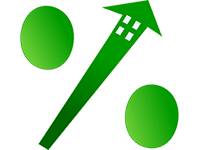
If you are considering taking out a loan, it’s important you understand all the terms and conditions involved. This includes early repayment charges (ERCs).
In this blog, we will look at what ERCs are, when you might have to pay them and how they might impact your financial decisions.
What are early repayment charges?
Early repayment charges are fees imposed by lenders if you pay off your loan or mortgage earlier than the agreed-upon term. These charges are designed to compensate lenders for any interest they would have earned had you kept the loan for its full duration.
It’s important to note that not all lenders charge early repayment fees. Therefore, if you think you could be in a position where you might be able to pay earlier, it’s worth looking for a product that does not have these fees.
When do early repayment charges apply?
ERCs apply when you repay a loan or mortgage earlier than you originally agreed. This could happen in a number of situations:
- You overpay your mortgage: Some lenders will allow you to overpay your mortgage by a certain amount. However, if you pay over this amount, you might face these charges.
- You decide to pay off your entire mortgage or loan: If you decide to pay off your entire mortgage/loan in one lump-sum, you may be charged an early repayment fee.
- Switching mortgages too early: If you switch to a new mortgage before your current deal ends, you may face these fees. Make sure to check the exact end date of your mortgage contract.
How much are early repayment charges?
Early repayment charges can differ depending on various factors, including the lender, loan type, and specific terms and conditions you agreed.
These charges can be calculated as a percentage of the outstanding loan amount, or the interest you would have paid if you stuck to the original terms.
Some lenders may use a tiered approach, where the charges decrease over time, while others may impose a flat fee.
To determine the exact amount, you should carefully review the terms and conditions of your loan or mortgage agreement.
Is it possible to get a mortgage without early repayment charges?
Yes, it is possible to get a mortgage or loan without ERCs. However, it can depend on the type of mortgage/loan you are getting and the lender you are borrowing from.
When searching for a product, it's important to carefully review the terms provided by different lenders. You can look for solutions that state they do not have ERCs.
It's worth noting that mortgages and loans without ERCs may have other trade-offs, such as slightly higher interest rates. Therefore, it's crucial to consider the overall terms, including interest rates, fees, and repayment flexibility, to make sure it aligns with your financial needs and goals.
Summary
Early repayment charges are fees you may need to pay if you are choosing to end your loan or mortgage earlier than agreed.
The cost of ERCs depend on the lender and product. You should always make sure that you understand the terms of your loan before agreeing to it.
It is possible to avoid ERCs with certain lenders, so it is worth shopping around carefully to find these.
It’s vital you understand your own financial situation before getting any loan. If you are aware of all the terms that comes with the loan, you can make a sensible decision on whether to pay your loan off early or not.




